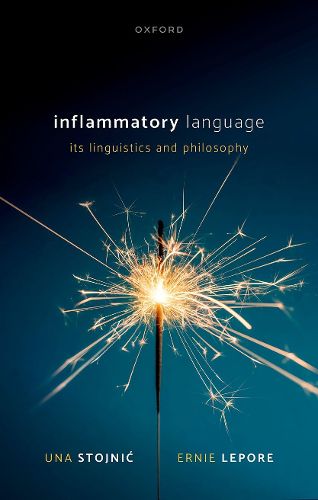Readings Newsletter
Become a Readings Member to make your shopping experience even easier.
Sign in or sign up for free!
You’re not far away from qualifying for FREE standard shipping within Australia
You’ve qualified for FREE standard shipping within Australia
The cart is loading…






It's a platitude that words can harm. But some words are more prone to do so than others--they are pejorative by design. Among those, slurs are particularly inflammatory: these are the epithets that derogate purely on the basis of group-membership, for example, on the basis of race, ethnicity, origin, religion, gender, sexual orientation, or ideology. Inflammatory Language is in large part about pejoratives, but mainly about this subclass of particularly inflammatory words, with a characteristic offensive sting. Slurs are powerful linguistic weapons: slurring someone constitutes a transgression more severe than an insult; it is an act of bigotry, not mere rudeness, derogating the entire group at once. Moreover, the offensive effect of a slur is surprisingly sticky, as even mere mentionings of slurs carry the risk of triggering their sting, so much so that such tokenings often have a full-on taboo status, subject to media censorship, sometimes even legislation.What is the source of this characteristic offensive sting that makes slurs such powerful linguistic weapons? A natural--and predominant--assumption is that it's some aspect of their meaning, semantically encoded or pragmatically conveyed. Consequently, most efforts at understanding slurs have been attempts to characterize their meanings and how they compose with those of other expressions, in a way that generates the offensive sting. However, even those who reject this majority position trace the offensive sting down to slurring words, arguing that it is their taboo status, or offensive tone, that explains their sting. Una Stojnic and Ernie Lepore argue this is a mistake. The distinctive pejorative effect of slurs, their characteristic sting, is not a matter of meaning, nor even language. Rather it is akin to the sting triggered by offensive gestures, symbols, or imagery, in that it is constituted by associations attached to and triggered by slurs' articulatory form--their typical pronunciation or spelling.
$9.00 standard shipping within Australia
FREE standard shipping within Australia for orders over $100.00
Express & International shipping calculated at checkout
It's a platitude that words can harm. But some words are more prone to do so than others--they are pejorative by design. Among those, slurs are particularly inflammatory: these are the epithets that derogate purely on the basis of group-membership, for example, on the basis of race, ethnicity, origin, religion, gender, sexual orientation, or ideology. Inflammatory Language is in large part about pejoratives, but mainly about this subclass of particularly inflammatory words, with a characteristic offensive sting. Slurs are powerful linguistic weapons: slurring someone constitutes a transgression more severe than an insult; it is an act of bigotry, not mere rudeness, derogating the entire group at once. Moreover, the offensive effect of a slur is surprisingly sticky, as even mere mentionings of slurs carry the risk of triggering their sting, so much so that such tokenings often have a full-on taboo status, subject to media censorship, sometimes even legislation.What is the source of this characteristic offensive sting that makes slurs such powerful linguistic weapons? A natural--and predominant--assumption is that it's some aspect of their meaning, semantically encoded or pragmatically conveyed. Consequently, most efforts at understanding slurs have been attempts to characterize their meanings and how they compose with those of other expressions, in a way that generates the offensive sting. However, even those who reject this majority position trace the offensive sting down to slurring words, arguing that it is their taboo status, or offensive tone, that explains their sting. Una Stojnic and Ernie Lepore argue this is a mistake. The distinctive pejorative effect of slurs, their characteristic sting, is not a matter of meaning, nor even language. Rather it is akin to the sting triggered by offensive gestures, symbols, or imagery, in that it is constituted by associations attached to and triggered by slurs' articulatory form--their typical pronunciation or spelling.